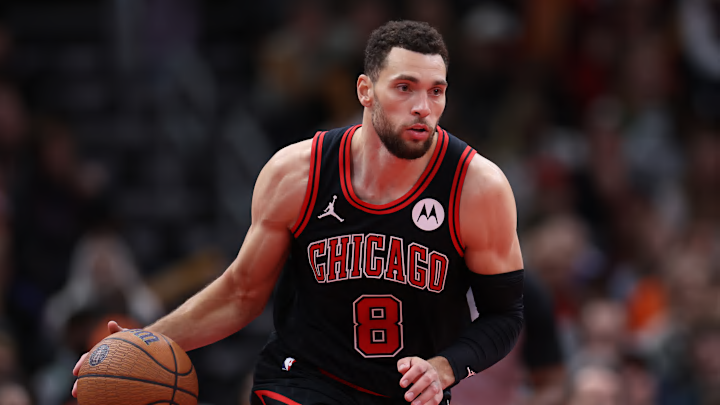There's been no shortage of Chicago Bulls trade chatter. Several prominent Bulls have continuously been named as trade targets for what has felt like half a decade. While DeMar DeRozan and Alex Caruso were finally sent elsewhere this past offseason, numerous veterans who remain playing at high levels have been made available on the Bulls' roster.
The two most notable trade targets are Zach LaVine and Nikola Vucevic. Of course, Chicago's best two players, LaVine and Vucevic, are ill-fitting on an 11-15 squad at 29 and 34 years old, respectively. Thus, the reason for the consistent trade chatter. Nevertheless, Patrick Williams, Lonzo Ball, Torrey Craig, Dalen Terry, and Julian Phillips are also players to monitor leading up to the February 6 trade deadline.
LaVine's trade value is on the rise
While so many Bulls are worth paying attention to on the trade market, LaVine prevails as the most polarizing player. The 11th-year guard is amid a Comeback Player of the Year caliber season. After only appearing in 25 contests a season ago and averaging 19.5 points, LaVine has already played 23 games this year and is back up to 21.7 points per game.
Perhaps what's most encouraging is LaVine's incredible shooting splits. The 6-foot-5 swingman is knocking down 50.1 percent of his field goals and 42.8 percent of his triples. He is one of eight players shooting above 50 percent from the floor and 42 percent from three. And, of the eight players, he is averaging the most three-point field goal makes per game.
Furthermore, the Bulls are better both offensively and defensively when LaVine is on the court. LaVine is the only Bulls' player over 200 minutes with a positive net rating on both sides of the ball. Although not known as a defensive asset throughout his career, LaVine is having one of his most impactful defensive seasons. Chicago's net rating decreases by nearly a point with the 29-year-old on the court. This is only the fourth time in LaVine's career that his team has performed better defensively with him on the floor.
Of course, LaVine's offense speaks for itself. Just watching the former UCLA Bruin lends itself to LaVine's offensive prowess. He's a smooth shotmaker who operates just as effectively on as he does off the ball. The Bulls are nearly eight points per 100 possessions better with LaVine on the court—which ranks in the 89th percentile.
Is trading LaVine plausible?
After all the praise, two questions persist. First, why would the Bulls even want to trade such an impactful player? Second, how has Chicago not found a home for an extremely talented offensive player who's shown he's no slouch on the defensive end?
To answer the first question, trading LaVine is not, by all accounts, an indicator of his level of play. As thoroughly discussed, the Bulls are far better with the 6-foot-5 guard in the lineup. However, with a record below .500 and one playoff appearance in the last seven seasons, there's no reason for the Bulls to keep the soon-to-be 30-year-old around. Instead of retaining LaVine, which directly correlates to winning basketball, trading the sharpshooter is in Chicago's best interest for a rebuild.
Second, Chicago has failed to find LaVine a new home solely because of his exorbitant contract. LaVine has three seasons and $215 million remaining on the five-year pact he signed in 2022. Under the new Collective Bargaining Agreement (CBA), acquiring a near-max-level contract is all but impossible, at least for contending teams.
Despite the significant hurdle in trading the two-time All-Star, ESPN Insider Bobby Marks listed LaVine on his "All-Trade Buzz: First Team," alongside Jimmy Butler, Brandon Ingram, Zion Williamson, and Jonas Valanciunas. Marks pointed to LaVine's increased statistical production, subsided injury concerns, and overall team (offensive) success as reasons behind the veteran's inclusion.
However, at the end of LaVine's blurb in the article, Marks referred to a conversation he had with a Western Conference General Manager. The general manager pointed to the new CBA devaluing LaVine. He said, "If we were operating under the 2017 CBA and there were no apron rules, I could make a case to my owner on LaVine." In the latter part of the quote, the general manager stated, "his salary boxes you into a corner."
Even though Mark has heard firsthand that a team is reluctant to trade for LaVine, he still included the 29-year-old on his "All-Trade Buzz: First Team," next to players on expiring contracts (Ingram and Butler) and players whose deals are far more tradeable (Williamson and Valanciunas).
LaVine is one of, if not the most polarizing trade candidates on the market. He's a respected talent league-wide. Nonetheless, his significant contract makes his value confounding. From being included on Marks' list of most closely monitored players a week after hearing trade talks are non-existent demonstrates the complexity and polarization of LaVine's value.
